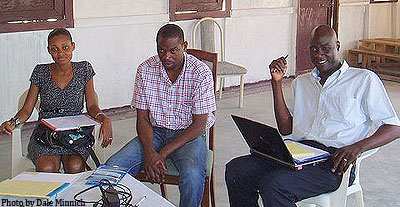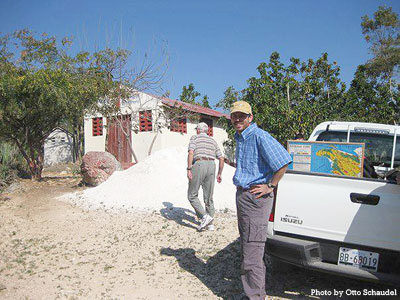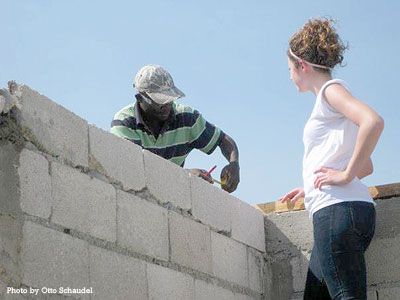 |
| Photo by Dale Minnich |
| Three of the Haitian doctors involved with the Haiti Medical Project: Kensia Thebaud, Pierre Emmerson, and Verosnel Solon. |
The Haiti Medical Project is growing with strong support from Brethren congregations and individuals. The support is making possible new developments, among them construction of a simple building on the headquarters compound of L’Eglise des Freres Haitiens (the Church of the Brethren in Haiti), the planning of more clinics in cooperation with the Haitian Brethren, and exploration of expansion into other areas such as neo-natal care and public health education.
A passionate ministry
The project began out of the experience of a Brethren medical delegation that offered clinics following the 2010 earthquake, in cooperation with the Haitian Brethren and Brethren Disaster Ministries. It has been energized by two US physicians who took part–Paul Ullom-Minnich of Kansas and Lori Zimmerman of Indiana–and former Mission and Ministry Board chair Dale Minnich who is retired from an executive position on the denominational staff.
When the project was first proposed to church staff it was estimated to cost $30,000 a year, “funds the Mission and Ministry Board did not have,” said Minnich. “The charge to Paul and other volunteers was to find a way to take this important project to the Brethren in ways that they would support it directly. This has happened in rather amazing fashion.”
Brethren have heard about the project by word of mouth, through presentations at venues like Annual Conference and Mission Alive, at congregational events, through promotional trips by Minnich and Ullom-Minnich, and through articles in “Messenger” and Newsline.
 |
| Photo by Otto Schaudel |
| Paul Ullom-Minnich, a physician from Kansas and convenor of the coordinating committee for the Haiti Medical Project, was part of the recent consultation trip to Haiti. He is shown here with Dale Minnich in the background, during the consultation group’s visit at the Laferriere congregation of L’Eglise des Freres Haitiens. |
One of the first congregational events to support the project was an international dinner in McPherson, Kan., organized by Ullom-Minnich and others near the end of 2010. That event generated about $7,000–enough to launch pilot clinics–and a growing enthusiasm in the McPherson community. Ullom-Minnich then traveled to North Manchester, Ind., to partner with Zimmerman to lead another congregational fundraising project that raised about $11,000. A promotional trip to eastern Pennsylvania included Dale Minnich as well.
Churches become supporters
Lancaster (Pa.) Church of the Brethren recently became the leading congregation in support of the Haiti Medical Project, after it was one of several congregations in eastern Pennsylvania to attend an August meeting organized by the project and led by Earl Ziegler, Jim Gibbel, and Larry Sauder. After hearing the needs explained in person. Lancaster announced in January a goal of raising $100,000. Eighty percent of the contribution will be for an endowment, with 20 percent helping to pay immediate needs of the project.
Three other congregations who had members at the meeting–Lititz, Spring Creek, and White Oak–have since taken large Christmas offerings benefitting the project.
The Brethren World Mission group has taken on the goal of providing at least $20,000 per year for five years and has already surpassed the first year objective.
Chiques Church of the Brethren near Manheim, Pa., is another congregation taking a strong interest. It sponsored a mission trip to Haiti in January 2012, held a Vacation Bible School event supporting the project, and approved sharing four offerings with the Haiti Medical Project during 2013–estimated to total $16,000. One Chiques member organized a craft project around the edges of the Atlantic Northeast District Disaster Auction, which raised some $6,000.
A staunch supporter since the beginning, McPherson (Kan.) Church of the Brethren has continued to host presentations by Paul Ullom-Minnich and is reported to be on the brink of taking a major fund-raising step to support the project.
Individuals also are expressing their interest with financial commitments. One $2,000 gift was received from a couple in Ohio, “far from any of our personal interpretation efforts,” Minnich says. “Their cover letter said they heard about it in ‘Messenger’ and encouraged us to continue the ministry.”
 |
| Photo by Otto Schaudel |
| A member of Midway Church of the Brethren (at right) helps with construction of the new building in Haiti that will house offices of L’Eglise des Freres Haitiens (the Church of the Brethren in Haiti) and headquarters of the Haiti Medical Project. |
Others are registering their excitement by visiting Haiti in person and volunteering at clinics or as construction workers on the headquarters building. Since January, for example, a Manchester University group and a group from Midway Church of the Brethren near Lebanon, Pa., helped with construction of the new headquarters, and Midway also assisted with a clinic. Michigan District members also have helped with the construction. A January term communication course at McPherson College was devoted to developing promotional materials and recommendations for the Haiti Medical Project through a competition between two 12-person teams.
Endowment cares for the future
Building an endowment for the Haiti Medical Project is a safeguard against an inevitable slackening of interest as the urgency of the post-earthquake situation fades. Work on the endowment is done alongside fundraising for immediate needs. “While some congregations prefer to concentrate on the immediate needs, the endowment idea has begun to take hold,” Minnich says.
As of the end of 2012, the project has received much more than the $30,000 needed to fund the first 16 clinics. “In fact,” Minnich says, “over $46,000 was raised for immediate needs and about $61,000 for the budding endowment. The strong support means that we are about ready to explore ways to expand the project–both by increasing the number of clinics and beginning new work in public health. Public health initiatives offer the greatest possibility to save many, many lives as issues of pure water, improved sanitation, and needed inoculations are addressed.”
Contact the Haiti Medical Project directly at paulu@partnersinfamilycare.com . For more information, contact Global Mission and Service executive director Jay Wittmeyer at jwittmeyer@brethren.org .